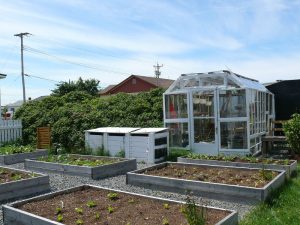A Green Heritage: Root Cellars Rock and Food Security
Newfoundland and Labrador is known for its rugged coastlines and barren landscapes, cold temperatures, and acidic soils. This results in tough agricultural conditions and short growing seasons, particularly in the north. Root cellars, though, have offered a sense of food security for hundreds of years to many families across the province. The nature of these structures allows for harvested vegetables and other perishable items, such as jam, to be stored for extended periods of time throughout the colder months of the year where growing your own crops would not be feasible. Throughout much of history, this resulted in residents depending upon the cod fishery and a stocked root cellar to survive throughout the winter months.
The Memory Store: All the doors face east… (captions available in both French and English). Enjoy this video with an English transcript.
Root cellars not only represent historical ways of living, but these traditional ways of living and storing foods have been recognized for their current potential in fighting food insecurity and promoting self-sufficient ways of living in the current day. In recent years, there has been an increase in local farming and home or community gardens, in addition to a resurgence of use and interest in root cellars in the province as people actively seek out more local, sustainable, and healthy living habits.
Sarah Ferber discusses what the use of cold room root cellars means for the future of food security in Newfoundland and Labrador. Enjoy this audio clip with an English transcript.
The ‘Root Cellars Rock’ project was designed by the Food Security Network of Newfoundland and Labrador (now Food First NL) to help people access food that is sustainable, affordable, and accessible all year round. The project aimed to educate people on four principles of local sustainable food ways that root cellars promote: planting, picking, preparing, and preserving.
Sarah Ferber tells us what the “Root Cellars Rock” project aims to achieve, how it helps us, and how the project links the past to the present day. Enjoy this audio clip with an English transcript.
The Memory Store: The root cellar – that is built heritage… (captions available in both French and English. Enjoy this video with an English transcript.


